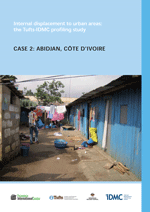After a series of political crises, Côte d’Ivoire’s armed conflict erupted in 2002, leading to the division of the country into government and rebel-controlled areas. Both sides committed grave human rights abuses and hundreds of thousands of civilians fl ed attacks on villages, kidnappings, and severe persecution based on ethnicity, nationality, or political opinion. Especially targeted were northern nationals and immigrants from Burkina Faso, Mali, and Niger. Many internally displaced people migrated to urban centers such as Abidjan, Grand Bassam, and Yamoussoukro, but in urban centers they were subject to government harassment, including, in Abidjan, demolition of housing and attacks. Three peace agreements brokered between 2003 and 2005 failed, but the signing of the Ouagadougou Peace Agreement in March 2007 raised hopes for a return to stability, and many IDPs have spontaneously started to return to their areas of origin.
Effective monitoring of IDPs in Abidjan has been hampered by their invisibility. UNFPA and UNHCR carried out surveys in 2005 and 2007 respectively; however, these did not cover all of Abidjan and were not representative. We made Abidjan a case study to address the need for information about IDPs and because the city met our study’s criteria.
This report is part of a study that took place from 2006-2008 in three urban locations. Surveys were conducted in each city in collaboration with Internal Displacement Monitoring Centre, Geneva.
- The Khartoum, Sudan case study is available here.
- The Santa Marta, Colombia case study is available here.
- Information on the methodology is here.
- Download the Methods Annex.







